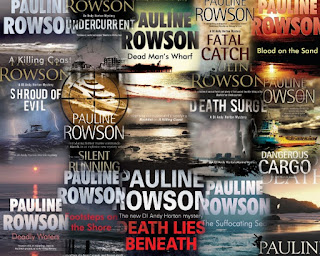Getting to grips with time frames in novels
 Time frames in
novels, and particularly when writing a series, as with the DI Andy
Horton novels, the Art Marvik mystery thrillers and my new 1950 set
mystery series featuring Scotland Yard detective Inspector Ryga , are a
tricky thing. There is ‘real time’ and there is‘fictional time’.
Time frames in
novels, and particularly when writing a series, as with the DI Andy
Horton novels, the Art Marvik mystery thrillers and my new 1950 set
mystery series featuring Scotland Yard detective Inspector Ryga , are a
tricky thing. There is ‘real time’ and there is‘fictional time’.
In
‘real time’ I write a DI Andy Horton and either an Art Marvik or
Inspector Ryga mystery in a year whereas in ‘fictional time’ the novels
are set over a shorter time frame.
Andy Horton was thirty nine when I created him in Tide of Death in 2006 so by now he should be fifty three. However, in ‘fictional time’ fifteen novels later, he is only forty. The novels take place not over fourteen years but over eighteen months, which means for DI Andy Horton there are an awful lot of murders in Portsmouth and the Isle of Wight, making it worse than Midsomer Murder on a good day!
It's said that Agatha Christie regretted making Hercule Poirot sixty when she created him because by the time she finished writing about him he would in ‘real time’ have been about a hundred and eight! In ‘fictional time’ Poirot stayed more or less the same age. I'm not saying that will happen to DI Andy Horton, he may age yet.

Following
'fictional time' allows the author to develop the back story. In
DI Andy Horton's case it allows me to chart his marital break-up, his
fight to gain access to his daughter, and his search for the truth
behind his mother’s disappearance when he was child. There are now
fourteen in the Inspector Andy Horton mystery series with number fifteen
A DEADLY WAKE due to be published on 2 June 2020. In this last one Andy
finally discovers the truth behind his mother's disappearance.
In my contemporary crime
novels I try to avoid mentioning the current year if I possibly
can, leaving it to the imagination of the reader. The other problem with
real time is that technology changes and so too do the names of police
departments as they are merged, re-organised and cut back. In the DI
Andy Horton novels I started off talking about the Serious Organised
Crime Agency which in October 2013 became the National Crime Agency. It
becomes increasingly difficult to keep up with all the name changes and
often by the time the novel is published some of the police departments
mentioned no longer exist in that format and that name.
Technology also advances so being specific can in one novel look bang-up-to-date and yet in another written a year or two later look grossly dated. MySpace, which was once all the rage, has been overtaken by Facebook in popularity, which in turn may very well also fade into the distance just as the iPad could become but a distant memory as something else replaces it. A powerful argument I think to create a police or murder mystery crime series set in the past which is what I have done with my 1950s set Inspector Ryga mysteries. Here I am specific about the year because it is an integral part of the crime novels.
 DEATH
IN THE COVE is set in 1950 England, reeling from the aftermath of war
with austerity and rationing biting hard. Newly promoted to detective,
Inspector, Ryga from Scotland Yard, is on his first solo investigation
outside of London, to solve the mystery of why a man in a pin-striped
suit is found murdered in an isolated cove on the Island of Portland in
Dorset.
DEATH
IN THE COVE is set in 1950 England, reeling from the aftermath of war
with austerity and rationing biting hard. Newly promoted to detective,
Inspector, Ryga from Scotland Yard, is on his first solo investigation
outside of London, to solve the mystery of why a man in a pin-striped
suit is found murdered in an isolated cove on the Island of Portland in
Dorset.
Pauline Rowson's gripping, entertaining crime novels full of twists and turns
Where to buy Pauline Rowson's books


Comments